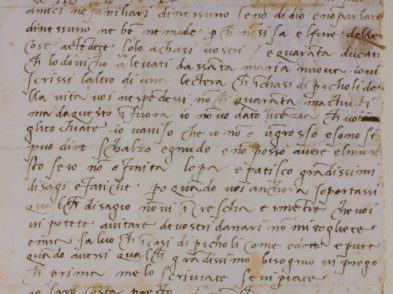The
friendly rules of party etiquette forbid the rabid discussion of religion and
politics, whose fanning flags risk turning the centerpiece candle into a
blazing hazard. We could even stretch that axiom another step: sociable guests
gathered around a yuletide table the day the fir goes up should avoid
money-talk, too. Especially with people, like Enrico, who actually have
it-unless you’re prepared to purchase philosophical fruit that’s bruised before
you even get it home from the market. Money can’t buy happiness. Even the
rich are known to cry. I soldi non sono importanti. Unfortunately, I am
almost never prepared for such sensibility, and it took me every tinseled scrap
of willpower in the house to avoid decorating him rather than the
Christmas tree.
In
English, we have cash for spending under the table, ‘dough’ for the ephemeral
elastic needs of greed and ‘dosh’ for a respectable night on the town in
top-hat. ‘Bread’ can buy much more than bread, and ‘cabbage’ stands for money
that folds. We use ‘bucks’ for daily over-the-counter exchange and ‘grand’ when
money manages to collect three zeros behind its braggart lead digit. Italians
who talk about money mention grana, a cheese similar to parmesan, which
also doubles as the word for trouble. A gruzzolo gets pinched and saved
for the future’s next hey-day and the being broke in the meantime merits the
phrase non ho il becco di una lira, there’s not even a chipped fragment
of the old currency left in one’s crab-filled pockets.
But the money we had
the misfortune of discussing on Immaculate Tuesday was the most dangerous
variety around: the kind that’s earned. At Christmas time, those who work
amidst the crowded ranks of time-indeterminate employment fuel their holiday
sprees with the much-awaited tredicesima, the thirteenth month of salary
that certain firms are still obliged to include in winter’s first paycheck.
However, those who earn their fivers freelance are left to chew the troubling
cud of the term a progetto. Italy, in times of economic crunch and reparatory
question-swept reform, considers work ‘a project’ rather than an authentic
source of livelihood. And perhaps this is where my bias lies.
Enrico, who on an
ordinary day is friend enough to deck my halls with boughs of holly, was the
one I most wanted to stuff as turkey. A business man who knows shrewd rules and
how to work in spite of them, he is actually quite a well-measured guy whom I
trust with most questions that count. Normally, he has no qualms about
generating quattrini-or admitting that most money in Italy is made through laudable skill or unmentionable
decadence.
That afternoon,
perhaps in efforts to clinch a late place on Santa’s Nice List, there was
nothing industrialist about him. The smell of pine had modified his brain
waves. ‘Money doesn’t matter,’ he was saying, picking the plums from his pile
of chestnut stuffing. Italians are sticklers about savory tasting, well,
savory.
I replied with equal
skittishness: ‘If money doesn’t matter, then why do we spend the better part of
the day trying to make it?’
He chewed, fork
mid-air and quite content to have found a tender chestnut. My bristling
porcupine nature did little to sting him. ‘That’s true,’ he agreed. ‘But what I
mean is, it’s not the most important thing.’
‘Okay, so what’s the
most important thing?’ If he could save himself, I was willing to wait.
‘Serenity,’ he said
as if the word were as light as the principle.
‘Earning one’s rent
money does wonders for serenity, haven’t you heard?’
He grinned. ‘I love
you so much better when you’re nice to me.’ His tone was teasing and
matter-of-fact.
‘I love you so much
better when you’re an entrepreneur,’ I replied. He was fact and I was matter.
‘Touché,’
he said, pulling a single quill from the heart of the discourse.
It
was going to be a Buon Natale. And soon we would be thinking solely of
silver stars atop freshly chopped pines and how to keep poinsettias alive until
after January 6th. Or pondering good will and world peace and how to make angel
wings from wire and netting scraps. Italy, in reality, is generous and well
populated when it comes to festivities. San Niccolò, Santa Maria,
Sant’Ambrogio, Santa Lucia, Santo Stefano-they stand as celebratory guardians,
tugging at the corners of the Christmas canopy so the season may stretch wide and
billowing over the whole of December. There is sufficient merriness to be
collected. Tradition-lovers seek mandarin oranges, carrots to feed Saint Lucy’s
donkey, candles that burn as long as night lasts and cow tongue that will be
thankfully silenced in time for the family’s fine boiled dinner. And
word-lovers like you and me will spend much time dispensing good wishes. May we
become healthy and wealthy and wise. And may our New Year’s gardens be well
cultivated with sprouting rows of Most Important Things.








